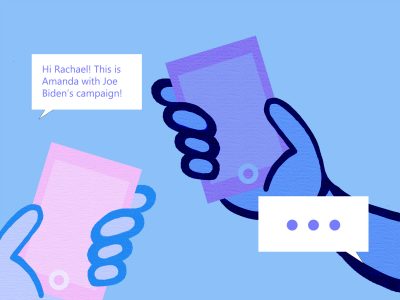Now that knocking on doors is an outreach strategy of the past, students working for local and national political campaigns have had to get creative. But the shift, some said, has produced unexpected advantages.

Victoria Fernandez, a sophomore in the College of General Studies, volunteered as a campaign worker for Democratic canvassing organization Progressive Turnout Project. Fernandez said the pandemic forced the team to reinvent its outreach strategy.
Fernandez had previously canvassed and gone door-to-door for Donna Shalala, a U.S. congressional candidate in the 2018 midterm elections. This year, Fernandez said, she planned to canvass for Democrats through the same organization.
“They had to keep pushing the date that we would start the field operations for months, until it went to August,” Fernandez said. “They were like, ‘Honestly, at this point, it’s kind of hopeless that we will turn back to normal life and the normal way that we’re used to campaigning.’”
As a result, the organization was forced to pivot from in-person canvassing to phone banking and letter-writing. The transition, she said, posed a variety of new challenges.
“Once you’re used to doing this as your main strategy for years,” Fernandez said, “you have to completely reinvent the way that you see things.”
Fernandez said canvassing in person is the most important and efficient way to reach out to voters, because it allows workers to engage in meaningful conversation, which can be difficult to accomplish on the phone. Still, phone banking has made it easier to reach voters in other states where the candidate needs campaign help, she said.
“It has a good side as well, just because everything’s virtual now, but it’s definitely hard to think about all those meaningful conversations that people used to have with voters,” Fernandez said. “People are just like, ‘No, leave me alone.’”
Anthony Buono, a senior in the College of Arts and Sciences, volunteered for New York State Assembly candidate Michael Marcantonio over the summer.
Like Fernandez, Buono said his campaign switched to phone banking. Because this is a method typically done closer to the election date, the group had to ramp up creativity in strategy.
The campaign also organized a mutual aid program under Marcantonio’s name to “keep his name in the community.” Campaigners reached out to constituents in the district to offer assistance, Buono said, or to ask if they were willing to help by participating in the program.
Lawyers and accountants on staff reached out to community members to offer legal and financial assistance, and campaign workers also delivered groceries to elderly people.
Buono said this helped Marcantonio gain high popularity among elderly voters, making the mutual aid program a “really, really good” campaign strategy.
In this way, Buono said, the pandemic enabled the campaign to use creativity to its advantage while also helping to connect people through empathy.
“I think the pandemic, even though we’re all socially distanced, brought my community back on Long Island much closer together,” Buono said. “When you call up that mom who has three kids, who’s juggling this whole life, and then she’s still able to say, ‘Yes I’m willing to help with the mutual aid group,’ that wouldn’t have happened if it wasn’t for [COVID-19].”
Buono said although this particular campaign strategy has died down now that people “care much less” about the pandemic, it provided a memorable experience.
“People have COVID fatigue,” Buono said. “But during those first couple months, it was really something special.”
Vivian Dai, a freshman in CAS, worked for two city council campaigns in California: Jake Tonkel for San Jose and John Lashlee for Mountain View.
Dai said Tonkel’s campaign was also largely focused on phone banking, with few workers going door-to-door. The small groups who do canvass in person typically consisted of Tonkel himself along with senior campaign volunteers.
Canvassers were typically met with warmth during their pandemic-era canvassing efforts, Dai said. Most residents don’t answer their doors, she said, but those who do were often receptive.
“People have actually been nicer than we expected when it comes to door-knocking,” Dai said. “A lot of people won’t be seriously offended like, ‘Oh, you’re endangering myself and my family, go away.’”
Dai said she also noticed an increased enthusiasm for local politics among young people this year. In the wake of social movements across the country, along with many college students staying in their hometowns, more young voters were asking for information on their municipal representatives.
“I think, in general, people have become more engaged,” Dai said. “Whether or not that engagement actually leads to tangible change remains to be seen.”
For CAS freshman Arlo Hatcher, phone banking for U.S. Sen. Ed Markey’s campaign, among others, showed him this year’s voters were generally more willing to converse on the phone.
While he said this may be because people have more time now that they’re often stuck at home, he attributes this mainly to the general perception that the 2020 election has “really high stakes.”
“For a lot of people, their lives have been relatively unaffected by politics in the past,” Hatcher said. “They’re now starting to get affected and starting to have to care a little more.”
BU also contributed its resources to students interested in political action this election round.
Jason Campbell-Foster, senior associate dean of students, said the tents set up by the University on the BU Beach and in front of the Joan and Edgar Booth Theatre will be in place for student use through at least Friday.
“Massachusetts has carved out exceptions for gatherings because of political expression,” Campbell-Foster said. “We are providing students with covered spaces where they can come together, share their thoughts, engage with one another.”
Campbell-Foster added the University might leave the tents up for longer if students express a need.
“The safest way to engage with political conversation is to use these outdoor spaces that we’ll be providing,” Campbell-Foster said.
Melissa Ellin contributed to the reporting of this article.


















































































































